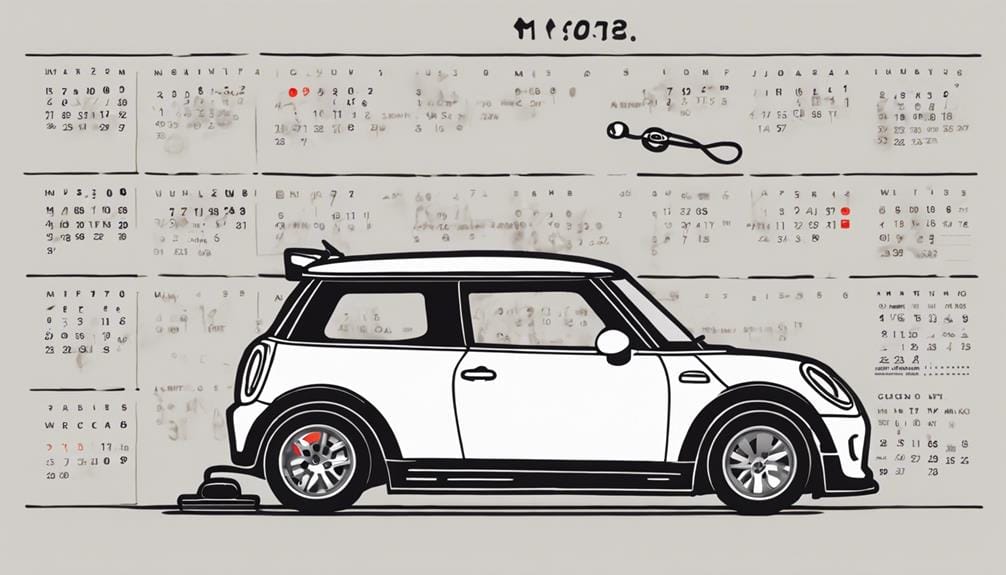Your Mini Cooper's fuel pump should last around 100,000 miles, but this figure can vary based on several factors, including fuel quality, how regularly you maintain your vehicle, and your driving conditions. High-quality gasoline and adherence to a strict maintenance schedule can extend its life. Low fuel levels, for instance, reduce lubrication and cooling, putting additional stress on the pump. Debris in your fuel can cause clogs and wear, while ethanol can be harsh on components. Recognizing symptoms like engine sputtering or decreased gas mileage early is important. With proactive maintenance and by addressing symptoms swiftly, you'll ensure your Mini Cooper performs well for longer.
Average Lifespan Expectancy
The average lifespan of a Mini Cooper fuel pump typically spans around 100,000 miles, contingent on factors such as fuel quality, maintenance regularity, and driving conditions. This figure isn't arbitrary; it's a benchmark that reflects the engineering and design rigor behind the Mini Cooper's fuel system. Understanding how long your fuel pump should last is important for maintaining your Cooper's performance and reliability over its lifetime.
Regular fuel system inspections and preventative maintenance play important roles in achieving this lifespan. These practices help identify and mitigate potential issues before they escalate into more significant problems. It's not just about reaching the 100,000-mile mark; it's about ensuring your Cooper operates efficiently every mile up to and beyond this point.
Furthermore, recognizing signs of fuel pump issues, such as engine sputtering, power loss, or decreased gas mileage, is essential. These symptoms can signify that your fuel pump's effectiveness is waning. Prompt diagnosis and timely replacement of a failing fuel pump are imperative to prevent further damage to your Mini Cooper's engine and fuel system. Therefore, while the average lifespan serves as a general guideline, your attentiveness to your Cooper's maintenance needs can greatly influence how long its fuel pump will last.
Factors Affecting Durability
Several factors critically influence the durability of your Mini Cooper's fuel pump, including fuel quality, maintenance habits, and operational conditions. Running your car low on gas frequently can greatly shorten the fuel pump's lifespan. This is because low fuel levels reduce the lubrication and cooling the pump requires to function at its best, leading to potential fuel pump problems.
Additionally, the presence of debris in your fuel can cause clogs and increase the wear on the pump, impacting fuel pressure and the overall health of the system. Ethanol in gas poses another challenge; it can be harsh on fuel pumps. Opting for non-ethanol fuel can prolong the life of your pump. Regular fuel filter changes are essential to prevent debris from reaching the pump and to maintain ideal fuel pressure. Neglecting this maintenance can lead to premature failure.
Proper fuel tank maintenance, such as keeping the tank at least half full, supports the performance and longevity of the in-tank pump. This practice not only helps in maintaining adequate fuel pressure but also ensures that the pump is properly lubricated and cooled, preventing common fuel pump problems and extending its service life.
Identifying Failure Symptoms
Identifying failure symptoms in your Mini Cooper's fuel pump requires attention to specific signs, such as intermittent Engine Management Light activation and unexpected engine cutoffs, to prevent serious operational issues. Being aware of these symptoms is important for the longevity and safety of your vehicle.
| Symptom | Implication |
|---|---|
| Intermittent EML Activation | Indicates sporadic fuel pump performance issues. |
| Engine Cuts Out When Stationary | Suggests the fuel pump may be failing to maintain proper fuel pressure. |
| Engine Sounds Like It Will Stall | A sign that fuel delivery is inconsistent, potentially due to a weakening fuel pump. |
| Complete Power Loss Risk | A severe symptom pointing towards imminent fuel pump failure, risking total vehicle shutdown. |
| Stalling on Motorway | Highlights the danger of a failing fuel pump, underscoring the need for immediate attention. |
Understanding these symptoms allows you to act promptly, ensuring your Mini Cooper remains reliable and safe. Technical insight into how each symptom affects your vehicle's performance is important for diagnosing fuel pump issues accurately. Stay vigilant and proactive in monitoring these signs to avoid being caught off guard by a failing fuel pump.
Maintenance Tips
To guarantee your Mini Cooper's fuel pump operates at its best, adopting a strict inspection schedule is essential.
You'll need to clean your fuel system regularly, as contaminants can greatly hinder pump performance.
Additionally, replacing your fuel filter as recommended prevents undue stress on the pump, safeguarding its functionality and extending its service life.
Regular Inspection Schedule
Adhering to a regular inspection schedule is crucial for maintaining the peak performance of your Mini Cooper. You should check your Mini Cooper's fuel pump every 60,000 to 90,000 miles to prevent unexpected breakdowns. This interval aligns with the manufacturer's guidelines and is critical for identifying wear and potential failures before they escalate.
A well-maintained fuel pump is pivotal for sustaining top-notch fuel efficiency and engine performance. By monitoring fuel pressure and the overall efficiency of your vehicle, you can gauge the health of your fuel pump. Proactive replacement of fuel filters and the choice of high-quality fuel are instrumental in extending the lifespan of the pump.
Ignoring these indicators can lead to premature pump failure, underscoring the importance of this regular inspection schedule.
Clean Fuel System Regularly
Beyond regular inspections, maintaining a clean fuel system is key to extending the lifespan of your Mini Cooper's fuel pump. Dirt, debris, and contaminants within the fuel system not only strain the pump but also impede ideal fuel flow, leading to potential clogs and damage.
By ensuring routine maintenance and cleaning of the fuel system, you're preventing premature wear, thereby safeguarding the longevity of the fuel pump. Adhering to the manufacturer's recommended intervals for fuel system cleaning can play a critical role in this. Such diligence helps maintain the integrity of the fuel flow, directly impacting the pump's efficiency and durability.
Timely Filter Replacements
Regular fuel filter replacements are crucial for guaranteeing the longevity of your Mini Cooper's fuel pump, as they prevent clogs and maintain ideal fuel flow. Timely filter maintenance is key to avoiding unnecessary stress on your fuel pump, which can lead to premature failure. Adhering to the recommended filter replacement intervals, typically between 30,000 to 60,000 miles, ensures that your vehicle maintains peak fuel efficiency and performance.
| Interval | Benefit | Consideration |
|---|---|---|
| 30,000 miles | Prevents early wear | Best for heavy usage |
| 45,000 miles | Balances maintenance | Average driving habits |
| 60,000 miles | Extends fuel pump life | Light usage |
Following manufacturer guidelines for fuel filter maintenance contributes significantly to a longer-lasting Mini Cooper fuel pump, safeguarding your investment and ensuring a smoother driving experience.
Replacement Costs
When considering the replacement of your Mini Cooper's fuel pump, you're looking at an average expense between $753 to $828 for parts alone, with labor adding another $135 to $171 to the total cost. These figures can fluctuate based on your location and any additional repairs that might be necessary.
Understanding the intricacies of these costs, from labor insights to factors that influence the price, is essential for budgeting accurately and ensuring your vehicle maintains its peak performance.
Average Replacement Expenses
Typically, the total cost to replace a Mini Cooper fuel pump, including labor and parts, ranges from $888 to $999, excluding taxes and any additional fees. This estimate underscores the significant investment required when fuel pumps need replacement due to wear or failure.
The breakdown of costs reflects the complexity of diagnosing and addressing a failing fuel pump, with parts costs typically ranging from $753 to $828. It's important to understand that these figures can vary based on your specific location and whether related repairs are necessary.
Given these variables, it's evident that the financial aspect of replacing a fuel pump isn't trivial and warrants thorough consideration, especially when evaluating the overall maintenance costs associated with owning a Mini Cooper.
Labor Costs Insights
Understanding labor costs is vital when budgeting for a Mini Cooper fuel pump replacement, as these expenses range from $135 to $171, not including taxes and additional fees. It's important to factor in these costs accurately to avoid surprises.
Here's a breakdown to give you a clearer picture:
| Expense Type | Cost Range | Notes |
|---|---|---|
| Labor Costs | $135 – $171 | Excludes taxes & fees |
| Parts Costs | $753 – $828 | Fuel pump specific |
| Total Replacement | Varies | Depends on location |
| Additional Repairs | Consider | For accurate budgeting |
Labor costs represent a significant portion of the total expense, highlighting the importance of considering all factors, including the possibility of related repairs, to ensure a comprehensive budget for your Mini Cooper's fuel pump replacement.
Price Influencing Factors
Numerous factors influence the replacement costs for a Mini Cooper fuel pump, from geographical location to the necessity for additional repairs, impacting the overall budget considerably. The complexity of replacing a high-pressure fuel pump or the incidental discovery of a worn spark plug can escalate costs unpredictably. Consider these critical elements:
- Geographical Location: Labor rates vary greatly across regions.
- Parts Pricing: The difference between $753 and $828 for parts alone.
- Labor Costs: Averaging between $135 and $171.
- Taxes and Fees: An often overlooked addition to the bill.
- Additional Repairs: The need to replace a spark plug or address other engine issues simultaneously.
Each of these factors plays an important role in the financial equation, demanding a thorough and analytical approach to budgeting for this essential repair.
Improving Pump Longevity
To improve the longevity of your Mini Cooper's fuel pump, it's essential to keep the fuel tank at least half full, ensuring peak function and reducing wear. This practice is particularly important for the Cooper S model, where the high-performance demands place additional strain on the fuel system. A consistently well-maintained gas tank not only facilitates peak pump operation but also minimizes the risk of overheating by ensuring adequate cooling, especially important in the tightly engineered confines of a Mini Cooper.
Furthermore, committing to regular changes of the fuel filter can greatly extend the life of your fuel pump. This maintenance step prevents contaminants from clogging the pump, ensuring it operates under less stress. Opting for top-tier gas offers better lubrication and cleaner combustion, which, in turn, enhances the pump's efficiency and longevity. Additionally, the specific choice to seek out non-ethanol fuel sources can be a game-changer. Ethanol can be harsher on the internal components of the fuel system, so using ethanol-free gasoline helps in preserving the integrity of the pump's internal seals and components, reducing the likelihood of premature failure.
Conclusion
To sum up, your Mini Cooper's fuel pump lifespan teeters on a multitude of variables, each critically impacting its durability. By vigilantly observing failure symptoms and adhering to meticulous maintenance protocols, you're not just prolonging its life but ensuring peak performance.
Yet, when the inevitable arises, brace for the financial implication of replacement. Remember, enhancing pump longevity isn't just about immediate care; it's about understanding and preempting the intricate dance of wear and tear.
The key? Stay ahead, stay informed.


